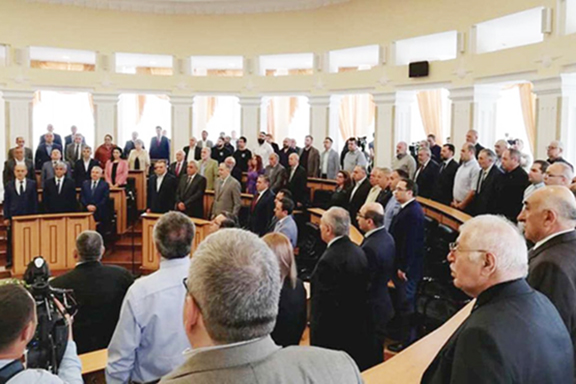By Asbarez | Wednesday, 08 May 2019

Participants of the Armenia-Artsakh Strategic Treaty Forum in Stepanakert on May 7
Dozens of political, military and civil society experts gathered in Stepanakert Tuesday to address the Armenia-Artsakh Strategic Treaty, an issue that has been discussed for several years, without fruition, and to emphasize the importance of drafting and signing such a document as a lever to advance the security of Armenia and Artsakh, as well as to further efforts to garner international recognition for the Artsakh Republic.
The forum, organized by the Armenian Revolutionary Federation, took place in the chambers of the Artsakh National Assembly, whose speaker Ashot Ghulyan welcomed the participants to Stepanakert and emphasized the importance of the forum as a means to further strengthen Armenia and Artsakh.
Ghulyan pointed that it is impossible to envision Armenia without Artsakh and Artsakh without Armenia, saying this cohesion strengthens Armenian capabilities and inspires confidence in the future, while at the same time buttressing the security of both republics.
Armenia-Artsakh Strategic Treaty is envisioned to be a document that will legally cement Armenia’s continued support for Artsakh and clearly delineate the parameters of cooperation in economic, social, political and military realms.
The participants of the forum were members of political parties represented within and outside of both the Armenian and Artsakh parliaments, as well as political and military experts who currently or in the past have had a direct role from the onset of the Artsakh Liberation Movement.
The forum provided an opportunity to exchange views on the matter and to assess the scope of issues that would be included in an eventual Armenia-Artsakh Strategic Treaty.
ARF Bureau President Armen Rustamyan told the forum that at the current stage of the Karabakh conflict resolution process, the adoption of such a document would not only advance the agenda of peace, but would also become a tool to guarantee the security of both Armenia and Artsakh, given that since the signing of the Karabakh cease fire agreement in May 1994, Armenia has assumed the role of not just caretaker, but also the sole entity that has maintained the security and stability of the region.
He emphasized that the treaty must be viewed from the perspective of guaranteeing Armenia’s and Artsakh collective security, safety and defense in various spheres by delineating the relations between the two republics based on critical national interests and ideals.
The imperative for drafting and implementing a collective treaty was also emphasized by the ARF Bureau’s political affairs director Giro Manoyan, who pointed out that while such a document might not be welcomed by the Karabakh conflict resolution mediators—the OSCE Minsk Group co-chairs—past events, such as the 2016 April War, have shown that postponing this effort would not be beneficial to the advancement of a peaceful resolution of the conflict.
“We have no right to blame others, if we do not show determination,” said Manoyan. “Such a step will defend the rights of Artsakh’s population and will substantiate legal concerns such as the deployment of soldiers from Armenia on the frontlines.”
During his presentation, Artsakh’s Human Rights Defender Artak Beglaryan said that the issues must be viewed from the perspective that the ultimate goal is the reunification of Artsakh and Armenia.
“The treaty is not a goal, but a means to achieve the goals. There is consensus on the goal—the final goal of reunification with Armenia. There is no consensus on the method of achieving it. Is it through independence or direct reunification?” said Beglaryan.
The human rights defender, who is also known as the ombudsman said that Armenia and Artsakh do not have sufficient external clout to counter what he called “sharp turns,” saying that preparations for a final treaty document could signal the expectations to the international community.
He emphasized that Azerbaijan is advancing through its own strategy, in which relations between Armenia and Artsakh are irrelevant.
Also among the speakers at the forum was former ARF Bureau chairman Hrant Markarian who warned of a danger looming around Artsakh and the Karabakh conflict resolution process.
“The danger is that some Armenians believe Artsakh is a burden and that it is necessary to lift that burden as soon as possible,” said Markarian, adding that there are also people who believe Artsakh is an opportunity for Armenians to become strong.
“Artsakh will help us develop the Armenian economy and liberate Gandzak and Nakhichevan. Artsakh is vital for Armenia’s existence. We can enhance the country, but we can’t do it by making concessions. Even the smallest concession will lead us to doom. This doesn’t mean we shouldn’t negotiate. Even if Azerbaijan makes a concession, we must realize that this conflict is eternal,” added Markarian, saying that all Armenians need to unite as one, become organized and win this battle for our nation’s existence, even if it takes centuries.
At the conclusion of the forum, a 15-member organizing committee was chosen to review the presentations and prepare a declaration based on them.
The body is comprised of the following individuals: Vartkes Baghryan (Armenia), Gagik Petrosyan (Artsakh), Davit Ishkhanyan (Artsakh), Armen Rustamyan (Armenia), Giro Manoyan (Armenia), Ishkhan Saghatelyan (Armenia), Gegham Manukyan (Armenia), Davit Shahnazaryan (Armenia), Sergey Bagratyan (Armenia), Gegham Nazaryan (Armenia), Ruben Melikyan (Armenia), Masis Abrahamian (Netherlands), Seyran Baghdasaryan (Russia), Melik Karakavorian (Lebanon) and Vache Thomassian (United States).
comments
A Nation Betrayed, A Future to Reclaim: Why Unity is Our Only Path Forward at the 2026 Elections
Armenia Has Become Largest Buyer of Indian Weapons
ARF AU Statement: In solidarity with Tavush
OPED: The Beginning of a New Struggle
Already Scarce Bread to be Rationed in Artsakh Due to Blockade
Artsakh Political Factions Agree On New President
Pashinyan Warns International Community of New Azerbaijani Attacks Against Armenia, Artsakh
Artsakh Students, Kidnapped by Azerbaijan, Released into Armenian Custody
Artsakh Says Azerbaijan’s Demands Further Complicate Situation